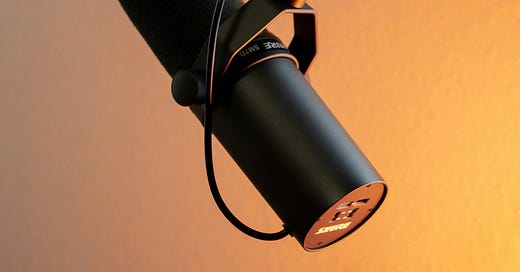Why Aren't Electronic Music Podcasts More of a Thing?
a.k.a. In the wake of the US election, podcasts seem more powerful than ever, but when it comes to electronic music, they barely move the conversational needle.
Of all the unlikely (and unfortunate) winners that emerged from the US election last week, one of the most surprising wasn’t even on the ballot: podcasts.
Amid of all the post-mortems of what happened—most of them focusing on where the Democrats went wrong—one theme that’s been repeated over and over is the rising power of “new media.” Also referred to as “alternative media,” the term is a catch-all for pretty much everything that exists outside the traditional media ecosystem, and while the latter is often billed as the “mainstream media,” it’s worth asking if that terminology is still appropriate. In a world where much of the populace is now getting their news (and, more importantly, commentary on the news) not from newspapers, magazines and broadcast networks, but a sprawling constellation of podcasts, social media, newsletters, blogs, Reddit threads, Discord servers and other (largely unregulated) outlets, it seems clear that the ability of the “mainstream” press to shape the cultural conversation has been severely compromised.
With many traditional media outlets visibly struggling to remain viable, let alone relevant, an army of YouTubers, TikTokers, Instagram influencers, Substack writers and Twitter diehards have rushed in to fill the void. But of all the aspiring talking heads out there, it’s podcasters who have proven to be the most emblematic of the ongoing media shift. In recent years, images of guys—and yes, it’s mostly guys—with microphones have become ubiquitous, particularly on social media, their supposed expertise bolstered by the presence of a Shure SM7B. It seems ridiculous, but after Donald Trump made interviews with Joe Rogan, Theo Von, Andrew Schulz, Adin Ross, the Nelk Boys and other members of the digital bro network a centerpiece of his campaign strategy, this rapidly growing sphere of podcasters and online influencers—many of which, as Marc Maron depressingly pointed out, come from the world of comedy—has emerged from the election more powerful than ever before.
It’s interesting, then, that this dynamic hasn’t yet reared its head in the electronic music world. While the level of interest in that world is obviously minuscule when compared to American politics, electronic music is still the foundation of a global, multibillion-dollar industry; moreover, it’s a space where non-traditional media outlets—and podcasts in particular—are relatively few in number and limited in their influence. Where other cultural and artistic endeavors—film, television, books, stand-up comedy, etc.—are swimming in alternative media options, those looking for electronic music coverage and commentary are largely stuck with a handful of publications, most of which are not just exceedingly weak, but distrusted by wide swaths of their target audience.
The situation, it seems, is ripe for an influx of new voices, and artists themselves are increasingly stepping into that role, employing marketing techniques that mimic those of online influencers. Music journalism has also begun to embrace the influencer model, albeit mostly via short-form content that’s been optimized for social media. Podcasts, on the other hand, have never really taken hold in the electronic music realm. Why?



